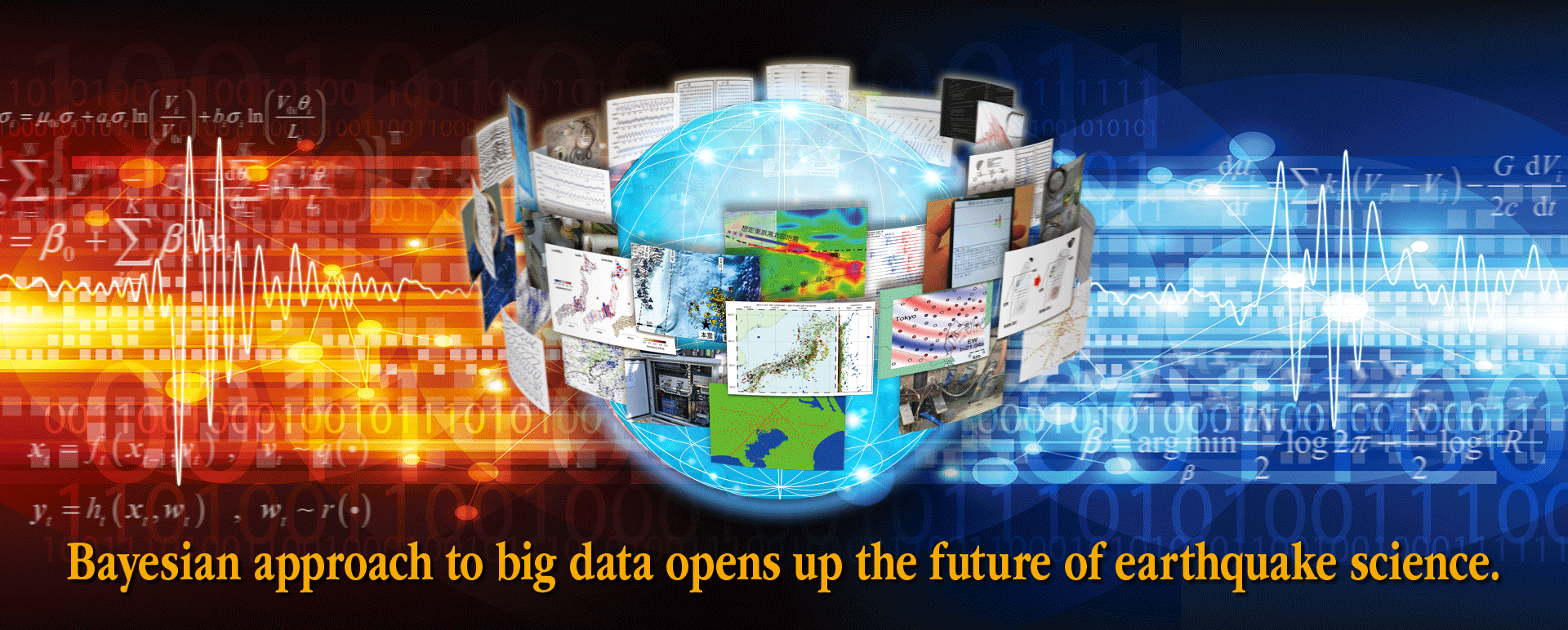In our country, more than 1,000 seismic stations have been continuously acquiring high-resolution digital seismic data. A large amount of instrumentally measured vibration data, which can be so-called big-data, will be available in near future. The data consist of both the conventional high-quality seismic data by well-calibrated seismometers and many kinds of new vibration data measured by accelerometers based on Micro Electro Mechanical Systems (MEMS), which are installed in such as infrastructures, lifelines and smartphones. The aim of this project is to develop, collaborating with the forefront of Bayesian statistics, a set of algorithms that enable us to comprehensively analyze the seismic data obtained by sensors of various types, which eventually contributes to prevention/mitigation of seismic disasters and clarification of earthquake phenomena.
News Flash
-
Aug.1-2, 2022We organize the session entitled [IG06] Data-driven Modeling in Geoscience in AOGS2022.
-
Jun.2, 2022Prof. Komaki received the "27th the Japan Statistical Society Award" from the Japan Statistical Society. Prof. Yano received the "36th Ogawa Research Encouragement Award" from the Japan Statistical Society. Dr. Kano received the "30th Tsuboi Prize of the Geodetic Society of Japan" from the Geodetic Society of Japan.
-
May.22, 2022We organize the session entitled Seismic Big Data Analysis Based on the State-of-the-Art of Bayesian Statistics in JpGU2022.
-
Apr.1, 2022Dr. Motoko Ishise joins the ERI/UTokyo group.
Dr. Yasuo Sasaki joins the Tohoku University group. -
Jan.14, 2022NEWSLETTER Vol.2 was published.
-
Aug.3, 2021We organize the session entitled [IG] Data-driven Modeling in Geoscience in AOGS2021.
-
Jul.12, 2021The research "Data-Driven Approach for Noise Reduction in Pressure-Sensitive Paint Data Based on Modal Expansion and Time-Series Data at Optimally Placed Points", Prof. Nonomura contributed, has been press-released.
-
Jul.10, 2021A PR video of this project is posted at the open campus in ERI.
-
Jun.3, 2021We organize the session entitled Seismic Big Data Analysis Based on the State-of-the-Art of Bayesian Statistics in JpGU2021.
-
Jun.1, 2021An article that introduced Prof. Nagao's research has appeared in The Journal of The Institute of Electrical Engineers of Japan.
-
Apr.19, 2021A PR video of this project is posted at the ERI exhibit booth in EGU2021.
-
Jan.27, 2021An article that introduced this project (Prof. Nagao's writings) has appeared in The Headquarters for Earthquake Research Promotion News -Winter 2020-.
-
Nov.27, 2020We are now recruiting members. The application deadline is 22nd January 2021. See ERI Site for details.
-
Sep.26, 2020Mr. Yasuo Sasaki received SICE Annual Conference Young Author's Award.
-
Oct. 1, 2020Dr. Kosuke Morikawa was promoted to lecturer.
-
Sep.28, 2020An article that introduced Prof. Nagao's research has appeared in Nikkei Construction.
-
Sep.3, 2020An article that introduced Prof. Nagao's research has appeared in Nikkei xTECH.
-
Sep.1, 2020NEWSLETTER Vol.1 was published.
-
Sep. 9-12, 2020We organize the session entitled "The forefront of earthquake big data analysis" in Japanese Joint Statistical Meeting 2020.
-
Jun.1, 2020An article that introduced Prof. Nagao's research has appeared in Nikkei Science 2020.07
-
May.7, 2020Dr. Mukuhira received Young Scientist Award of Commendation for Science and Technology by the Minister of Education, Culture, Sports, Science and Technology.
-
May.1, 2020Prof. Maeda received Paper Award from The Seismological Society of Japan. Dr. Yoshimitsu received Young Scientist Award from The Seismological Society of Japan.
-
Jul.12-16, 2020We organize the session entitled Seismic Big Data Analysis Based on the State-of-the-Art of Bayesian Statistics in JpGU-AGU2020
-
Apr.14, 2020An article that introduced Prof. Nagao's research has appeared in Nikkei Business Daily.
-
Apr.1, 2020Tohoku University group joins this project.
-
Apr.1, 2020Dr. Ryo Kurihara joins the ERI/UTokyo group.
Dr. Michiko Okudo joins the IST/UTokyo group. -
Nov.11, 2019We are now recruiting members. The application deadline is 29th November 2019. See ERI Site for details.(Sorry, Japanese version only.)
-
Sep. 8-12, 2019We organize the session entitled "The forefront of earthquake big data analysis" in Japanese Joint Statistical Meeting 2019.
-
Aug.18-21, 2019We organize the session entitled "Recent developments of Bayesian methodology to utilize seismic big data" in 11th International Workshop on Statistical Seismology (StatSei11).
-
May.27, 2019We organize the session entitled "Seismic Big Data Analysis Based on the State-of-the-Art of Bayesian Statistics" in JpGU2019.
-
Mar.19, 2019Dr. Kano received Young Scientist Award from The Seismological Society of Japan.
-
Feb. 1, 2019Dr. Sumito Kurata joins the IST/UTokyo group.
-
Jan. 1, 2019Dr. Shigeki Nakagawa joins the ERI/UTokyo group.
-
Jun. 1, 2018Dr. Nana Yoshimitsu was promoted to project assistant professor.
-
Apr. 1, 2018Drs. Nana Yoshimitsu and Takahiro Shiina joined our project as project researchers.
-
Oct. 1, 2017Our project entitled “Intelligent seismic data processing based on integration of next-generation seismic observations and the forefront of Bayesian statistics” (PI: Prof. Naoshi Hirata, Earthquake Research Institute, The University of Tokyo), which was accepted in the research area of JST CREST “Development and application of intelligent measurement-analysis methods through coalition between measurement technologies and informatics” (Intelligent Measurement Analysis), launched.








